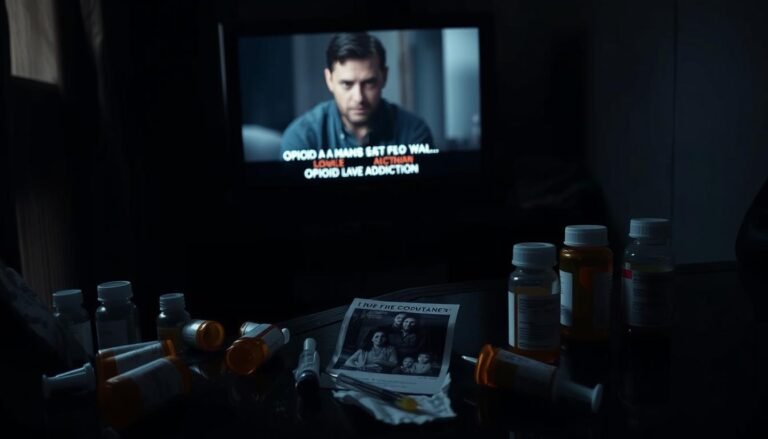Get Professional Help with Drug Addiction Today
Breaking free from addiction is possible. Drug abuse can feel overwhelming, but there’s hope. Professional addiction treatment can transform lives for those struggling or their loved ones.
SAMHSA offers a 24/7 addiction helpline at 1-800-662-HELP (4357). This confidential service provides info on local treatment options and support groups. You can find inpatient rehab centers, outpatient programs, and telehealth therapy.
Seeking help for drug addiction shows strength, not weakness. You’re not alone on this journey. Millions have overcome addiction and now lead fulfilling lives.
With expert guidance and support, you can recover too. Don’t let fear stop you from getting help.
Key Takeaways
- SAMHSA’s National Helpline provides 24/7 support for addiction recovery
- Professional addiction recovery programs offer various treatment options
- Seeking help is a crucial step towards overcoming substance abuse
- Recovery is possible with the right support and treatment
- Don’t let stigma prevent you from getting the help you need
Understanding Substance Use Disorder and Addiction
Substance Use Disorder (SUD) is a complex mental health condition affecting millions of Americans. It involves uncontrolled substance use despite harmful consequences. People with SUD often fixate on substances like alcohol, tobacco, or other psychoactive drugs.
How Addiction Affects Brain Chemistry
Repeated substance use can cause lasting changes in brain chemistry. This can lead to tolerance, requiring larger amounts for the same effect. It can also trigger withdrawal symptoms when use stops.
Common Signs of Drug Dependency
Spotting drug dependency signs is key for timely substance abuse support. Some common indicators include:
- Impaired control over substance use
- Social problems related to substance use
- Dangerous use patterns
- Increased tolerance
- Withdrawal symptoms when not using
Breaking the Stigma Around Addiction
Addiction isn’t a character flaw or weakness. SUD is treatable, and breaking the stigma encourages people to seek help. Addiction recovery resources and mental health support are vital for treatment.
| Substance Use Disorder Statistics | Data |
|---|---|
| Americans with SUD (age 12+) | 1 in 6 |
| SUD patients not receiving treatment | More than 85% |
| SAMHSA National Helpline | 800-662-HELP |
| Crisis Support | 988 Suicide & Crisis Lifeline |
Effective SUD treatments include medication, therapy, detoxification, and support groups. Don’t hesitate to seek help if you or someone you know is struggling.
Recognizing When You Need Help with Drug Addiction
Drug addiction is a serious issue. Drug rehab centers can help those struggling with substance use disorders. Recognizing addiction signs is crucial for seeking proper treatment.
Understanding the impacts of addiction guides you towards effective treatment programs. It’s important to take action early to prevent serious consequences.
Self-Assessment Guidelines
Evaluate your drug use patterns honestly. Keep a log of your usage frequency and amount. Think about why you use drugs and what consequences you’ve faced.
If you can’t stop despite wanting to, consider exploring addiction recovery tips. Self-assessment is a vital step towards recovery.
Warning Signs to Watch For
Key indicators that you may need professional help include:
- Increased tolerance to drugs
- Experiencing withdrawal symptoms
- Inability to cut down or quit
- Neglecting responsibilities due to drug use
- Continuing use despite negative consequences
Recognizing these signs is crucial. If you notice them, reach out to addiction treatment programs for support.
Impact on Daily Life and Relationships
Substance use can affect many aspects of your life. Notice changes in your work, relationships, and health. Drug use straining connections or interfering with responsibilities signals a need for help.
“In 2022, there were 107,941 overdose deaths due to drug addiction.”
This statistic highlights the urgency of recognizing addiction early. Seeking help from drug rehab centers is crucial. Acknowledging the need for assistance is a brave first step.
Available Treatment Options for Substance Abuse
Choosing the right addiction recovery program can be daunting. Options range from inpatient to outpatient rehab. Each option addresses different needs and severity levels of substance use disorders.
Inpatient rehab provides round-the-clock care in a structured setting. Patients live at the facility for 30 days to several months. This approach suits those with severe addictions or co-occurring mental health issues.
Sadly, many don’t get the help they need. Over 46 million Americans have a substance use disorder. Yet, 94% don’t receive treatment.
Outpatient rehab allows patients to live at home while attending therapy. It’s suitable for milder cases or as a step-down from inpatient care. Programs vary from a few hours weekly to daily sessions.
- Detoxification: Often the first step, managing withdrawal symptoms
- Behavioral counseling: Addresses underlying issues
- Medication-assisted treatment: Helps manage cravings
- Sober living homes: Provide structured environments post-treatment
Recovery is a personal journey. The ideal program blends medical care, therapy, and support. It should meet your unique needs. Seeking help is the first step towards reclaiming your life.
Professional Addiction Treatment Programs
Seeking help for addiction is courageous. Various rehab centers and treatment options exist to suit your needs. Let’s explore some key choices.
Inpatient Rehabilitation Centers
Inpatient rehab provides 24/7 care. You reside at the center and receive constant support. This option works well for severe addictions.
Most stays last 30 to 90 days. Nurses, doctors, and counselors are available to assist you throughout your journey.
Outpatient Treatment Services
Outpatient care allows you to live at home while receiving treatment. You visit a clinic for therapy and check-ins. This option suits those with work or family commitments.
Programs vary in frequency. Some meet daily, while others convene a few times a week.
Medication-Assisted Treatment (MAT)
MAT combines medicine with counseling to ease cravings and withdrawal. It’s particularly effective for opioid addiction. Medicines like buprenorphine or methadone can make quitting more manageable and safer.
| Treatment Type | Duration | Key Features |
|---|---|---|
| Inpatient Rehab | 30-90 days | 24/7 care, structured environment |
| Outpatient Services | Varies | Flexible, allows work/family balance |
| MAT | Ongoing | Medication + counseling, reduces cravings |
Addiction counseling is crucial in all these options. It helps you understand your triggers and develop coping strategies. The right combination of care can guide you towards recovery.
The Role of Therapy in Recovery
Therapy is crucial in addiction recovery. It uncovers the root causes of substance use and helps rebuild relationships. Through counseling, you can develop healthier coping skills and address related mental health issues.
Several therapy types support the journey to sober living:
- Cognitive Behavioral Therapy (CBT): Practiced since 1905, CBT helps reduce anxiety and symptoms of eating disorders.
- Dialectical Behavioral Therapy (DBT): Combines CBT elements and provides group support to boost self-esteem.
- Motivational Enhancement Therapy: Helps overcome addictive patterns by finding inner drive to change.
- Experiential Therapy: Includes adventure therapy, music therapy, and art therapy to release emotions and work through trauma.
Professional help through therapy is essential. Paola Vidauri Luna, a Clinical Therapist, emphasizes expert support in breaking free from addiction. Therapy offers structured, specialized, evidence-based care.
Many resist therapy due to stigma, denial, or fear. However, attempting recovery alone can be risky. Therapy provides tools and support to avoid relapse and maintain sobriety.
| Therapy Type | Benefits |
|---|---|
| Cognitive Behavioral Therapy | Reduces anxiety, addresses eating disorders |
| Dialectical Behavioral Therapy | Boosts self-esteem, provides group support |
| Motivational Enhancement Therapy | Overcomes addictive patterns, finds inner motivation |
| Experiential Therapy | Releases emotions, works through trauma |
Seeking help is a sign of strength. Therapy allows you to express genuine feelings and gain valuable insights. It helps build a supportive community for lasting recovery and mental health support.
Support Groups and Community Resources
Support groups are vital for addiction recovery. They provide a safe space to share experiences and learn coping strategies. These groups help you build a network of understanding peers.
12-Step Programs
12-step programs are popular addiction support groups. Alcoholics Anonymous (AA) and Narcotics Anonymous (NA) use this approach. AA has 1.5 million active members in the U.S., while NA holds 70,000 weekly meetings globally.
These groups focus on admitting powerlessness over addiction. They also encourage recognizing a higher power in the recovery process.
SMART Recovery Options
SMART Recovery offers a science-based alternative to 12-step programs. It uses a 4-point system combining motivational enhancement and cognitive behavioral therapy. This approach empowers you to take control of your recovery journey.

Family Support Groups
Family support is crucial in the recovery process. Groups like Al-Anon, Nar-Anon, and Families Anonymous help loved ones cope. They provide tools for supporting family members in recovery.
These groups also focus on maintaining your own well-being while helping others.
| Support Group Type | Examples | Focus |
|---|---|---|
| 12-Step Programs | AA, NA, CA | Spiritual approach, peer support |
| Alternative Programs | SMART Recovery, SOS | Science-based, self-empowerment |
| Family Support | Al-Anon, Nar-Anon | Coping strategies for loved ones |
Combining support groups with therapy can boost your recovery success. The SAMHSA national helpline (1-800-662-HELP) can help you find local addiction support resources.
Detoxification and Withdrawal Management
Drug detox services kick off substance abuse treatment. This phase clears harmful substances from your body. It sets the stage for addiction recovery support.
Medical Detox Programs
Medical detox programs offer safe environments for managing withdrawal symptoms. These programs last from a few days to two weeks. Inpatient rehab centers provide 24/7 care during detox.
Managing Withdrawal Symptoms
Withdrawal can be tough, with symptoms like anxiety, insomnia, and nausea. Medical supervision is crucial, as some withdrawals can be life-threatening. Doctors may prescribe medications to ease symptoms and ensure safety.
- Alcohol withdrawal may level off within a week
- Benzodiazepine detox can take up to 2 weeks or longer
- Cocaine withdrawal is often more psychological than physical
Post-Detox Care
Detox is just the start of your recovery journey. After detox, it’s vital to continue with comprehensive substance abuse treatment. This may include counseling, support groups, or ongoing rehab programs.
“Detox is the initial stage of addiction treatment; it is typically insufficient for a successful recovery.”
Understanding detox and seeking help is a big step towards recovery. You’re not alone in this journey. Addiction recovery support is available to guide you.
Building a Strong Recovery Support System
Recovery from addiction is easier with support. A robust network can greatly impact your journey to sober living. Let’s explore how to build a system that nurtures your recovery.

Your support system should include people who understand your struggles. Family support is crucial, but it’s not the only resource. Consider expanding your circle to include other supportive individuals.
- Sober friends
- Support group members
- Counselors or therapists
- Sober living housemates
- Recovery coaches
Addiction recovery resources come in many forms. Support groups offer a space to share experiences and learn from others. These groups can be a lifeline during challenging times.
Sober living environments provide a drug-free space to build healthy habits. Living with others in recovery can strengthen your commitment to sobriety. It also offers daily support.
“Recovery is a process of change through which individuals improve their health and wellness, live self-directed lives, and strive to reach their full potential.” – Substance Abuse and Mental Health Services Administration (SAMHSA)
A strong support system isn’t just about avoiding relapse. It’s about creating a fulfilling life in recovery. Engage in community activities and pursue hobbies.
Build new, healthy relationships. These actions support long-term sobriety and overall well-being.
| Support Type | Benefits |
|---|---|
| Family Support | Emotional stability, practical help |
| Peer Support Groups | Shared experiences, coping strategies |
| Professional Counseling | Targeted therapy, relapse prevention |
| Sober Living Homes | Structured environment, peer accountability |
Building a strong support system takes time and effort. With the right people and resources, you’re better equipped to face challenges.
You can enjoy a fulfilling life in recovery. It’s worth the effort to create a supportive network.
Preventing Relapse and Maintaining Sobriety
Staying sober requires daily effort and support. Relapse prevention strategies are crucial for recovery. Common triggers like insomnia and fatigue can lead to setbacks.
Identifying Triggers
Knowing what sparks cravings is vital for addiction recovery. Triggers can be people, places, or emotions linked to past substance use.
The 5-4-3-2-1 coping technique can help ground you when faced with urges. It engages your senses, shifting focus away from negative thoughts.
Developing Coping Strategies
Building healthy habits is key for substance abuse support. Mindfulness meditation has been shown to improve sobriety rates significantly.
Deep breathing exercises, like the 4 x 4 technique, can boost mood and induce relaxation. Regular exercise, a balanced diet, and yoga can strengthen your resolve.
Creating a Relapse Prevention Plan
Your plan should include emergency contacts of supportive friends or family in recovery. The “play the tape through” method helps visualize consequences before acting on urges.
Relapse rates for addiction are similar to those of chronic illnesses like diabetes. With proper strategies and support, you can overcome challenges and stay sober.






